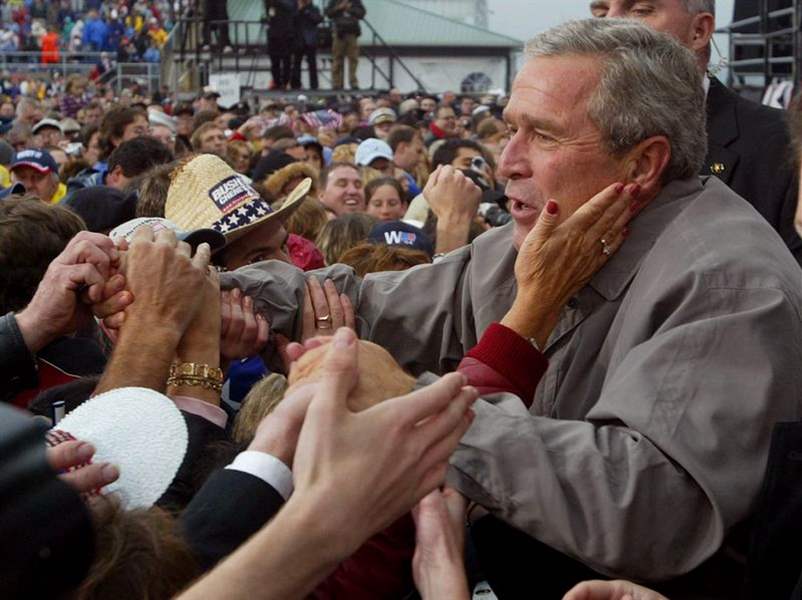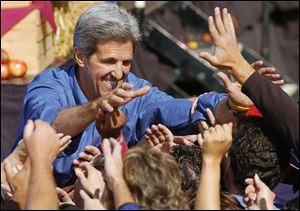
Presidency: Tight contest goes down to the wire
10/31/2004
President Bush campaigning in Pennsylvania.
PABLO MARTINEZ MONSIVAIS / AP

Sen. John Kerry at a rally in Elyria, Ohio, in early October.
WASHINGTON - From the outset, the presidential election of 2004 has been President Bush's to lose.
After the Sept. 11, 2001, terrorist attacks, his job approval soared. If he wins on Tuesday, it will ratify conventional wisdom that many Americans in wartime - the war on terror and the war in Iraq - are wary of changing horses in midstream. If he loses, it will be because many Americans question the rationale for the war in Iraq and blame him for an underperforming economy.
Sen. John F. Kerry, a Massachusetts Democrat, has served in the Senate for 20 years but was unknown to most voters until he defeated former Vermont Gov. Howard Dean in the Iowa Democratic caucuses in January and eventually won his party's nomination. He is still struggling to make himself more of a "pro-Kerry vote" than an "anti-Bush vote."
If Mr. Bush wins re-election, it will be because at 58, with the advantages of incumbency, he fired up his conservative base and drew evangelical voters who skipped 2000 but now are worried about issues such as abortion and gay marriage. If Mr. Kerry, 60, wins, it will be because he bucked up lukewarm Democrats, got record numbers of Hispanics and blacks to the polls, and at the last minute persuaded undecided voters unhappy with Mr. Bush to take a gamble on a man many complain they don't know well enough.

President Bush campaigning in Pennsylvania.
Throughout this year, pollsters have been befuddled by this election because the nation is split so closely down the middle.
While Mr. Bush has maintained a tiny lead nationwide when voters are asked who they plan to vote for, Americans now know it is not the popular vote that matters: Mr. Bush lost the popular vote in 2000 to Al Gore.
In battleground states that will decide the election - such as Ohio, Michigan, Pennsylvania, Florida, Wisconsin, and Iowa - there has been so little daylight between Mr. Bush and Mr. Kerry in the polls that statistically, the election is too close to call.
And then there's the question of just how accurate the polls are. Cell-phone use has swelled over the last four years, meaning that pollsters may be missing a lot of younger voters who have only wireless devices, not traditional land-line telephones.
Another unknown is how many of the record number of newly registered voters will go to their polling location and vote, but it is expected to be much higher than it was four years ago. In 2000, half of eligible voters voted, but the intensity of this campaign and the public's rising political passions could dramatically boost turnout.
This year thousands of voting machines have been replaced or improved in some states, meaning that as many as 1 million votes that were uncounted four years ago may be counted this year. But already potentially monumental legal issues have arisen about ballots cast in the wrong precincts in key states and what is required for voter identification. If such problems are widespread, the election results again could be in doubt for hours or days.
And returning as an electoral wild card is Ralph Nader, the consumer activist running as an independent. An average of six national polls recently indicated that Mr. Bush could win over Mr. Kerry by less than 1 percent with Mr. Nader getting 1.4 percent. Although he continues to insist he is not a spoiler and nationwide is getting between 1 percent and 2 percent of public opinion polls, in several battleground states, he seems to be capable of taking enough votes from Mr. Kerry to possibly give Mr. Bush an edge.
In some past elections, many voters complained there wasn't much difference between the two major-party presidential candidates. That is not true this year.
As the three debates between Mr. Bush and Mr. Kerry showed, they are both strong men with strong convictions and disagree on almost every significant issue, including abortion, the war in Iraq, civil liberties, health coverage, energy, the environment, funding for education, and national security.
In an ABC/Washington Post Poll taken recently, the economy and joblessness were cited as the most important issue by likely voters, followed closely by the war in Iraq, terrorism, health care, and education.
Mr. Kerry's surrogates, such as former President Bill Clinton, who campaigned for Mr. Kerry last week after recuperating from heart surgery, urge voters to support Mr. Kerry because he pledges to repeal tax cuts for the wealthy and reduce the deficit. They say Mr. Bush has been incompetent in prosecuting the war on terrorism and should have enticed more allies to fight the war in Iraq.
Kerry backers say he would put more U.S. soldiers there before beginning to withdraw them in six months and pursue the hunt for al-Qaeda leader Osama bin Laden more aggressively. They say Mr. Kerry would promote energy independence, provide better health care and prescription drug coverage, restore the ban on assault weapons, put more police officers on the street, provide more money for homeland security, and end the trends under Mr. Bush of increasing poverty and unemployment. Others say that those who support abortion rights should vote for Mr. Kerry because Mr. Bush would nominate Supreme Court justices who would repeal Roe vs. Wade, the court ruling that legalized abortion.
When Mr. Bush's surrogates speak for him, they stress that in leading the country after Sept. 11, 2001, he has been steadfast, strong, and resolute in pursuing terrorists. They note that he pushed tax cuts through Congress that they claim ended the recession. They say he helped free Afghanistan from the Taliban and brought democratic elections to that country. They also point out that he ended Saddam Hussein's brutal reign in Iraq.
They claim Mr. Kerry has shifted positions on Iraq and other fronts, confusing voters about where he stands. They say Mr. Bush is willing to add to his legacy the risks of changing Social Security by letting younger workers set up private savings accounts so they have a "nest egg" the government "can never take away." They say that if both houses of Congress stay Republican, Mr. Bush would have a good chance of pushing through his goals of reducing lawsuits against medical personnel, simplifying the tax code, granting small businesses tax credits to let employers set up health savings accounts for employees, and enacting his faith-based initiatives to promote more volunteerism.
As is always the case with their presidential candidates, Americans will weigh heavily the characters of Mr. Bush and Mr. Kerry. Polls show that when taken as a group, voters have just about decided that each man has strengths and weaknesses that almost cancel each other out, and that while each man's past is important, their pledges and visions for the country are crucial. For every voter who complains that Mr. Kerry seems too distant and not personable enough, there are an equal number who say the more genial Mr. Bush has disappointed them in office.
Peripheral issues seem less important this year, voters say. There are those who admire Laura Bush's traditional approach to being a first lady. There are others who like Teresa Heinz Kerry's independent spirit and philanthropy. There are some who are swayed by the strengths and weaknesses of the running mates, Vice President Dick Cheney and Sen. John Edwards, although most voters say their decision will be based primarily on the top of the ticket.
One of 14 likely voters remains undecided. Pollsters say these tend to like Mr. Bush's personality more than they like Mr. Kerry's but are more worried about the economy than other voters.
As the campaigning ends, Americans in such states as Ohio, swamped with political ads, no doubt will be delighted to have the deluge of costly, negative, even spurious charges end on both sides. The Bush campaign has said that if Mr. Kerry wins, terrorists will get a boost, an accusation strenuously denied by the Kerry campaign.
The Kerry campaign has charged that Mr. Bush would weaken Social Security and restore the draft, despite the President's denials.
No matter who wins, it's a near given that in such a polarized climate, half of American voters are likely to be upset and even angry at the outcome, giving the ultimate winner an enormous challenge to unite the country enough to govern effectively.
Contact Ann McFeatters at:
amcfeatters@nationalpress.com
or 202-662-7071.